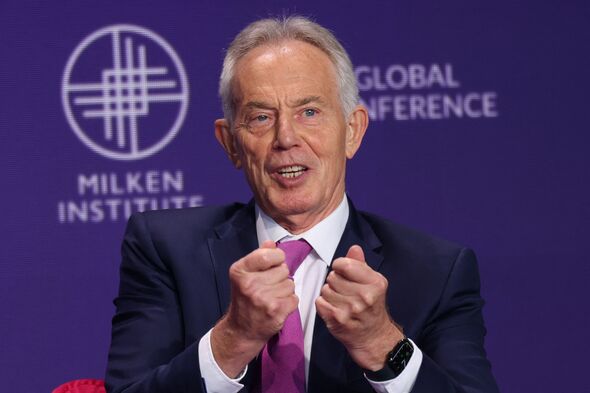
An inflatable dinghy carrying migrants is escorted by a French Warship a (Image: Getty Images)
A new Five Eyes-style alliance is the only way to smash serious organised crime gangs – including drug and people trafficking, illegal arms sales, cyberattacks and fraud – which have become so endemic they now pose a strategic threat to national resilience and international stability. With small boat crossings at a record high, county lines gangs operating nationwide, and cyberattacks now a part of life, a top think tank says the UK government must lead a new International Serious and Organised Crime Alliance to not just catch the criminals, but eliminate their operations.
Global Serious Organised Crime Gangs pocketed $3.1 trillion in 2023 – 3% of global GDP – with drug trafficking and human exploitation among the most lucrative markets. But according to a damning new paper by the Tony Blair Institute, the current approaches fail to account for the changing nature of organised crime. It says a new tech-focused Five Eyes Alliance is needed to focus on eliminating full criminal operations, rather than the current ‘whack-a-mole’ approach to individual criminals.
Read more: Small boats destined to carry over 1,000 illegal migrants to Britain seized i…
Read more: Criminals exploit Oasis reunion tour to fuel record-breaking ticket scams acr…

Hacker attacking internet (Image: Getty Images)
One key recommendation is the power to impose cross-border sanctions on banks that recklessly enable crime and cutting off supply lines through sting operations.
The Five Eyes alliance is a powerful multilateral intelligence alliance between Australia, Canada, New Zealand, the United Kingdom, and the United States that evolved from a post-WWII agreement between the US and UK.
The new study warns that crime gangs are no longer loyalty-bound, hierarchical mobs, but are instead decentralised, highly adaptable, and ruthlessly entrepreneurial, mirroring the structure and ambition of high-growth companies. These enterprises operate fluidly across borders, exploiting regulatory grey zones, and using advanced technologies to outpace law enforcement systems hamstrung by “outdated” reactive, jurisdiction-bound methods.

Former British Prime Minister Tony Blair (Image: AFP via Getty Images)
Alexander Iosad, Director of Government Innovation Policy at TBI, said: “Organised crime has evolved. We are no longer facing mob bosses and gangsters, but agile, global businesses built for speed, scale and profit. The UK cannot afford to let them enrich themselves at the expense of our citizens’ wallets and the safety of our streets.
“To stop this, you don’t go after low-level operatives while the rest of the organisation covers up and adapts. You take out its entire ability to operate; you sanction the leaders and enablers, you remove its capital, institutions, methods, technology and supply lines they operate on.
“Criminals don’t respect borders so we must work across them to win. An Alliance of countries, united by shared values and desire to stop these modern mafias, can create international black-out zones, ceasing their operations and their impact on our communities entirely.”
The proposed Alliance would feature a ‘tiered’ structure based on existing trust, operational capability and strategic relevance, with the first tier including the Five Eyes nations along with France, Germany, the Netherlands, Sweden and Norway.

Wanted hackers coding virus ransomware using laptops and computers. Cyber attack, system breaking an (Image: Getty Images)
“Unlike existing structures it would not focus on prosecuting individuals, but dismantling entire criminal business models by targeting enablers, intermediaries, and logistical infrastructure. Key would be a new tech-powered offensive, hacking and infiltrating communications channels used by organised crime gangs and flooding their services with fake targets, such as AI models that pretend to be fraud victims, or incorrect information. Through pooling data and computing power, the Alliance could also deploy AI to map networks, track illicit finance, and intervene quickly, enhancing disruption without needing to share sensitive personal data across jurisdictions.
Alongside this offensive, TBI recommends the implementation of joint sanctions to freeze assets and block access to financial systems, education, and residency for criminals and their dependents. Service providers who enable organised crime, such as banks and law firms, would also face fines and suspensions.
Collectively, these sanctions would increase the costs of operations, while wiping out several of the structures they rely on, limiting profitability and business viability.
The report also proposes that the Alliance’s collective borders be used to cut off criminal supply lines. Through coordinated enforcement across port and trade routes and tactics like honey-trap stings and delivery interceptions, Alliance countries could together disrupt operations and erode trust in criminal gangs.
It argues that by raising costs, increasing risk, and injecting instability into criminal networks, the Alliance would make it near-impossible for organised crime gangs to operate at the scale they currently enjoy.
It almost feels like a cliché to say that serious and organised crime (SOC) is evolving rapidly and continuously in scale, shape and sophistication. However, after five years leading Interpol’s global operational responses to crime and terrorism, I’ve seen first-hand how far these escalating threats are outstripping our well-intentioned but linear, dated and fragmented response mechanisms. In any losing battle, it is necessary to draw back and reconsider one’s approach. That is why it is time for us to recognise that SOC is no longer simply a criminal-justice matter alone – it has become a societal threat, and it is time it was treated with the seriousness, focus and renewal of tactics this demands.
Looking at crime through its actual drivers and enablers – technology, transport, communication and broader logistical systems – it’s become impossible to ignore just how far our current models were falling short. Whether it was the fallout of the Afghan government’s collapse on drug flows and human trafficking, or the levels of sophistication, reach and ruthlessness of West African organised crime groups, the conclusion was the same: the criminal threats have moved on, and we haven’t.
Law enforcement is still chasing symptoms, not systems. Exceptional individuals working in law enforcement are constrained by legacy tools, bureaucratic structures and performance frameworks that were created for a bygone age. Prosecutions take years. Trials are complex and juries are expected to seize complex legal and evidential issues. Meanwhile the criminal networks regenerate.
This new paper highlights the urgent need for a bolder, more strategic and proactive set of tools that sit beyond law enforcement – including sanctions, online disruption and new global mechanisms that match the transnational nature of the threat.
Arrests alone will never dismantle criminal economies. Organised crime functions as an economy, and must be considered and tackled accordingly. This will require disrupting logistics, targeting financial facilitators, and redirecting seized assets to strengthen the very systems needed to fight back. This also means the private sector must at long last be integrated into the frontline response.
Criminals relish our adherence to old models. SOC has already shaped the world around us. Our response must now do the same.

Hackers with computer data theft in the social world. (Image: Getty Images/EyeEm)
Law enforcement is still chasing symptoms, not systems. Exceptional individuals working in law enforcement are constrained by legacy tools, bureaucratic structures and performance frameworks that were created for a bygone age. Prosecutions take years. Trials are complex and juries are expected to seize complex legal and evidential issues. Meanwhile the criminal networks regenerate.
This new paper highlights the urgent need for a bolder, more strategic and proactive set of tools that sit beyond law enforcement – including sanctions, online disruption and new global mechanisms that match the transnational nature of the threat.
Arrests alone will never dismantle criminal economies. Organised crime functions as an economy, and must be considered and tackled accordingly. This will require disrupting logistics, targeting financial facilitators, and redirecting seized assets to strengthen the very systems needed to fight back. This also means the private sector must at long last be integrated into the frontline response.
Criminals relish our adherence to old models. SOC has already shaped the world around us. Our response must now do the same.















